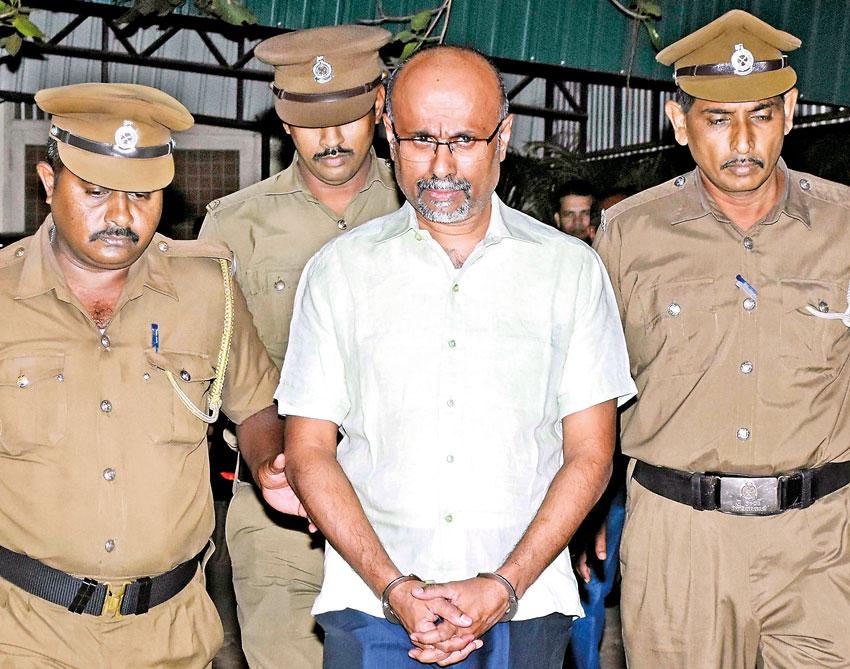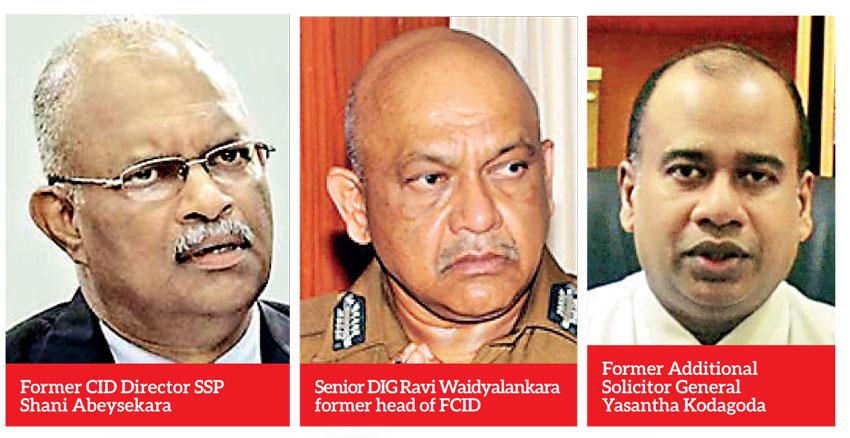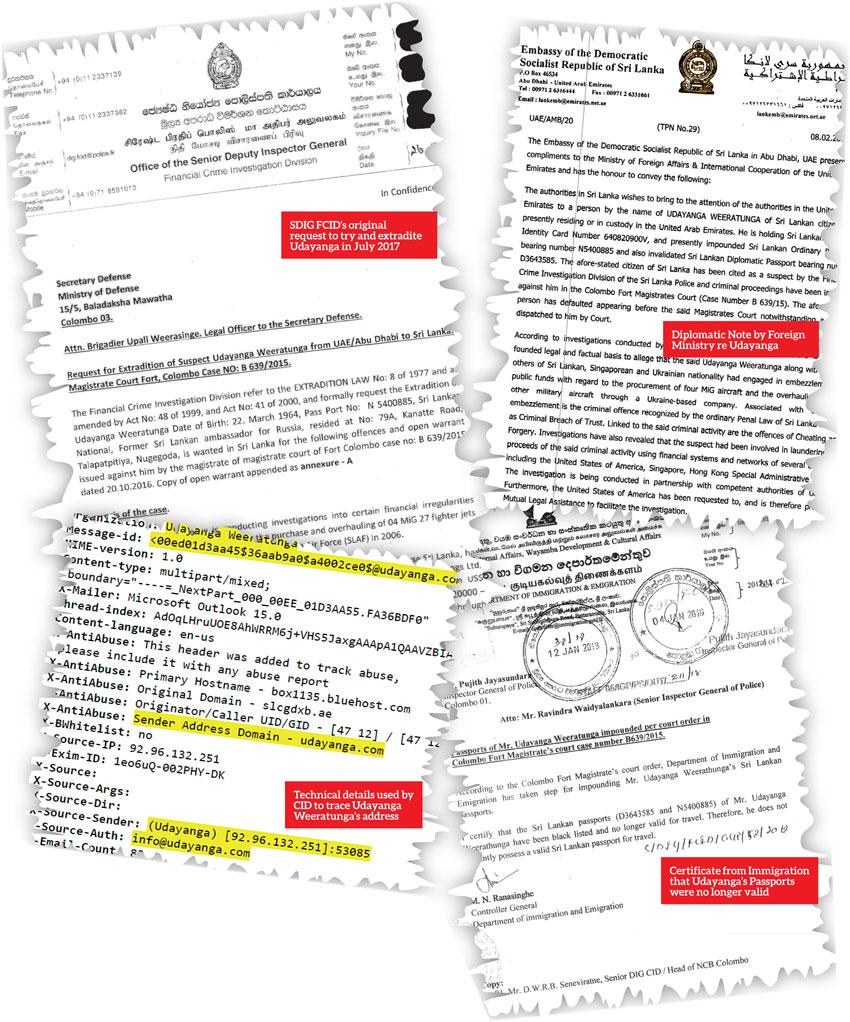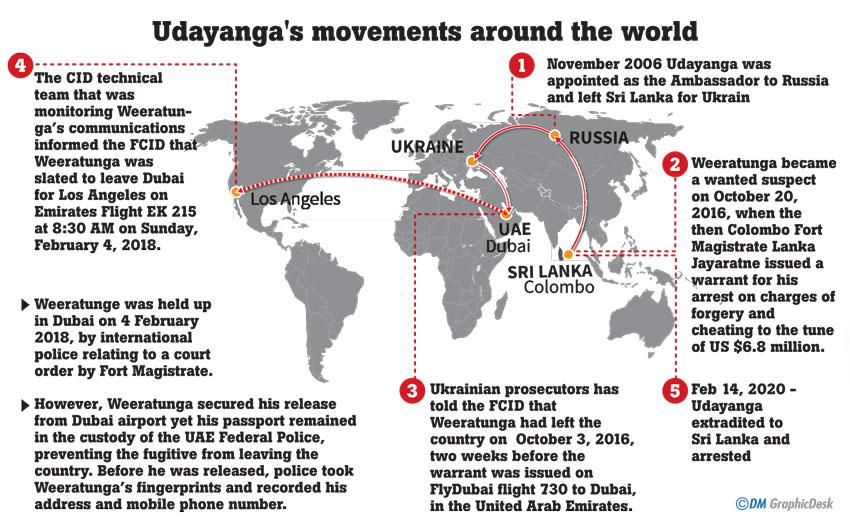27 Feb 2020 - {{hitsCtrl.values.hits}}

 The 2006 ‘MiG Deal’ is back in the spotlight, with the Financial Crime Investigation Division investigation into the saga has led to Sri Lanka’s first-ever successful extradition request of a suspect, Udayanga Weeratunga, who is the alleged mastermind of the deal according to police reports. The dramatic extradition of the former Sri Lankan ambassador to Moscow has been overshadowed by the efforts of senior officers of the Criminal Investigation Department (CID) to ensure he was granted bail. CID officers have now twice been reprimanded by Colombo Fort Magistrate Ranga Dissanayake for irregularly behaving in a manner that would result in the former ambassador being enlarged on bail.
The 2006 ‘MiG Deal’ is back in the spotlight, with the Financial Crime Investigation Division investigation into the saga has led to Sri Lanka’s first-ever successful extradition request of a suspect, Udayanga Weeratunga, who is the alleged mastermind of the deal according to police reports. The dramatic extradition of the former Sri Lankan ambassador to Moscow has been overshadowed by the efforts of senior officers of the Criminal Investigation Department (CID) to ensure he was granted bail. CID officers have now twice been reprimanded by Colombo Fort Magistrate Ranga Dissanayake for irregularly behaving in a manner that would result in the former ambassador being enlarged on bail.
 The Dailymirror after reviewing several years of government records to unearth the story of how Weeratunga went from being just another suspect absconding from the justice system, to become the first suspect to be forcibly returned to Sri Lanka by the order of a foreign court. The investigation revealed that this outcome was only made possible due to several exceptional officers of the Financial Crime Investigation Division (FCID) and CID, all of whom have either been punished, demoted or transferred after November 17, 2019.
The Dailymirror after reviewing several years of government records to unearth the story of how Weeratunga went from being just another suspect absconding from the justice system, to become the first suspect to be forcibly returned to Sri Lanka by the order of a foreign court. The investigation revealed that this outcome was only made possible due to several exceptional officers of the Financial Crime Investigation Division (FCID) and CID, all of whom have either been punished, demoted or transferred after November 17, 2019.
Weeratunga became a wanted suspect on October 20, 2016, when the then Colombo Fort Magistrate Lanka Jayaratne issued a warrant for his arrest on charges of forgery and cheating to the tune of US $6.8 million.
At the time the warrant was issued, the FCID believed Weeratunga to be residing in Ukraine, and the FCID contacted Ukrainian authorities for assistance in locating and deporting him to Sri Lanka.
However, the Ukrainian prosecutors has told the FCID that Weeratunga had left their country on October 3, 2016, two weeks before the warrant was issued on FlyDubai flight 730 to Dubai, in the United Arab Emirates.
In order to confirm his location, the FCID reached out to several law enforcement intelligence sources both in Sri Lanka and in other countries in the Middle East.
By late November, the FCID had received confirmation from a reliable foreign intelligence source that Weeratunga was indeed still in the United Arab Emirates. The FCID was assured that Emirati authorities could arrest Weeratunga and began the process of extraditing him to Sri Lanka if an INTERPOL ‘Red Notice’ or internationally recognized warrant could be obtained against him.

According to the B report (No: 639/2015) dated October 16, 2016, filed in Fort Magistrate Court by the FCID, CI Francis and SP Dayaratne found evidence that T.S. Lee’s arms firm DS Alliance, and several other dummy companies connected to Lee, had all made payments between 2006 and 2007 amounting to over $400,000, to a Commercial Bank account in Sri Lanka under the name of Lelum Duminda Manamperuma. The discovery was made in conjunction with a CID anti-money laundering team led by SP Piyasen Ampawila and IP Sanjeewani Dharmalatha, who had separately frozen Weeratunga’s accounts and were investigating his transactions. Manamperuma’s sister was the wife of Udayanga Weeratunga
FCID Chief Inspector Nihal Francis, the lead investigator on the MiG Deal, and Deputy Director SP Pavithra Dayaratne immediately contacted the CID, who is the Sri Lankan Bureau of Interpol, to seek assistance in getting a Red Notice issued on Weeratunga to enable his extradition. However, their requests went unheard.
Meanwhile, the Senior DIG in charge of the FCID, Ravi Waidyalankara, reached out to the Defence Ministry seeking assistance to formally extradite Udayanga Weeratunga from the United Arab Emirates (UAE), as the Defence Ministry is the central authority for extradition under Sri Lankan law.
Here too, Waidyalankara and the FCID found little support from the ministry, who told him extradition would not be possible because Sri Lanka did not have a bilateral extradition treaty with the UAE.
The law enforcement authorities in the United Kingdom helped them to establish that Bellimissa Holdings Limited, the dummy company to which the Sri Lankan Air Force paid US $14.6 million, was not in fact, a UK company as the Defence Ministry had insisted it was since the deal was first exposed in 2006.
In July 2007, The Sunday Leader under editor Lasantha Wickrematunge, published a full page expose, revealing that the UK address provided in documents for Bellimissa Holdings was indeed a mail forwarding address, and that the entity was a fake, used to siphon public money from the SLAF.


According to the information received by FCID, Bellimissa Holdings was in fact a company incorporated in the British Virgin Islands run by persons of Singaporean origin.
Authorities of the British Virgin Islands (BVI) on receipt of a formal request from CI Francis, provided details of the owners of ‘Bellimissa Holdings Limited’ to which Sri Lanka Air Force had paid US $14.6 million in exchange for US $7.8 million for goods and services.
By February 12, 2018, with the aid of officials from the Attorney General’s Department, CID officers including SDIG Ravi Seneviratne, SSP Shani Abeysekara, ASP Ranjith Wedasinghe and IP L.R. Rajakaruna assisted the FCID to issue an Interpol Red Notice for Weeratunga, the first time Sri Lanka had secured such a notice for a suspect who had not already been indicted or convicted. The CID forwarded the Interpol Notice to their counterparts in the UAE
According to the records received from the BVI, the owners of the company were two Singaporeans, Lee Thian Soo and Ng Lay Khim. The first name was no stranger to the FCID investigators. Known in Sri Lanka as ‘TS Lee’, Lee Thian Soo’s Singaporean firm D.S. Alliance Pvt. Ltd was the agent who sold MiG jets to the Air Force in 2000 at US $ 1.1 million each, or around half the price of the 2006 deal.
Following this Waidyalankara has summoned SP Dayaratne and CI Francis to his office and has shown a full page obituary notice from a May 2009 Singapore newspaper. The obituary, reproduced from microfilm kept at the Singapore national library, was for a Lee Sin Ghee. According to the notice, his son was Lee Thian Soo, and daughter-in-law was Ng Lay Khim.
As the evidence continued to mount, a ray of hope arrived in the effort to extradite Weeratunga when in July 2017, former Additional Solicitor General Kapila Waidyaratne, was appointed as Defence Secretary. Shortly after his appointment, Waidyalankara once again wrote to the defence ministry to get assistance to extradict Weeratunga from the UAE.

This time, he was met with some success, as the Defence Ministry began preparing a request for the relevant papers to be drafted by the Attorney General’s Department.
According to the B report (No: 639/2015) dated October 16, 2016, filed in Fort Magistrate Court by the FCID, CI Francis and SP Dayaratne found evidence that T.S. Lee’s arms firm DS Alliance, and several other dummy companies connected to Lee, had all made payments between 2006 and 2007 amounting to over $400,000, to a Commercial Bank account in Sri Lanka under the name of Lelum Duminda Manamperuma.
The discovery was made in conjunction with a CID anti-money laundering team led by SP Piyasen Ampawila and IP Sanjeewani Dharmalatha, who had separately frozen Weeratunga’s accounts and were investigating his transactions. Manamperuma’s sister was the wife of Udayanga Weeratunga.
The law enforcement authorities in the United Kingdom helped them to establish that Bellimissa Holdings Limited, the dummy company to which the Air Force paid US $14.6 million, was not in fact, a UK company as the Defence Ministry had insisted it was since the deal was first exposed in 2006
When CID Director, SSP Abeysekara was briefed on the findings and their implications, as well as the FCID’s efforts to seek Weeratunga’s extradition, he offered the FCID team use of one of the CID’s most sensitive and closely guarded secrets – the full capabilities of the technical intelligence unit.
It was officers of this unit who in July 2017 had broken into the Apple iPhone of bond scam mastermind Arjun Aloysius and recovered his emails, SMS, WhatsApp and Viber communications, all of which were laid out before the Presidential Commission in graphic detail, exposing Aloysius’ connections inside the Central Bank.
Shortly after SP Dayaratne and CI Francis shared with the CID team what information they had about the phone numbers, email addresses, Facebook and Skype account used by Weeratunga, the sleuths made another breakthrough and gained access to some of Weeratunga’s electronic communications. Using this channel, by mid-December 2017, the CID team briefed Waidyalankara that Weeratunga was planning to travel to the United States to visit his family members in California.
According to the initial intelligence received, his travel was imminent, leading Waidyalankara to spring into action. Detectives reached out to their counterparts in the United States to find out whether US authorities would be amenable to intercepting Weeratunga on his arrival at the Los Angeles International Airport in California and pre-arranging his deportation to Sri Lanka in the custody of FCID officers. US Law enforcement officers concurred with the plan and reported back that all they would need was formal proof that Weeratunga’s passport had been invalidated for travel.

With Weeratunga’s departure believed to be imminent, Waidyalankara and his team prepared to spring the trap.
In a single day, the Senior DIG shot off five letters to the CID, Attorney General, Foreign Ministry, Controller-General of Immigration and Defence Ministry.
From the Immigration Controller, he sought ‘a written certificate in the English Language under (your) signature attesting that the Sri Lankan passports of Udayanga Weeratunga have been impounded and are no longer valid for travel’ and that ‘Udayanga Weeratunga does not possess a Sri Lankan passport that is valid for travel’.
The letter continued cryptically that ‘the above is required for the purpose of communicating with foreign authorities regarding the possibility of initiating deportation or extradition proceedings’
To the Foreign Ministry, SDIG Waidyalankara requested that the Sri Lankan embassy in Abu Dhabi and other diplomatic posts be advised to prevent Weeratunga from obtaining a fresh passport or Sri Lankan travel documents, which may have allowed him to slip through the net. From the CID, Attorney General, Ministry of Defence, and the Senior DIG sought assistance for preparing a formal request for Weeratunga’s extradition on an urgent basis, in the event that the American component of the plan backfired.
On January 2, 2018, Immigration Controller-General M.N. Ranasinghe wrote back to Waidyalankara through the IGP, to provide the certificate he had sought. However, due to administrative delays at police headquarters, it was over one week, on January 12, 2018, that Waidyalankara received the Immigration Controller’s certificate to his hand and immediately shared it with his American counterparts to prepare them for “Operation Udayanga”.
Shortly thereafter, the CID technical team that was monitoring Weeratunga’s communications informed the FCID that Weeratunga was slated to leave Dubai for Los Angeles on Emirates Flight EK 215 at 8:30 AM on Sunday, February 4, 2018.
This information too was passed on to American customs and immigration authorities.
It is a little-known fact that even senior police officers are expected to report to work seven days a week. So, on the morning of Sunday, February 4, 2018, Senior DIG Waidyalankara, FCID Director SSP P.K.D. Priyantha, SP Dayaratne and CI Francis were in their offices, they received news that Weeratunga had not made it to his Emirates flight to Los Angeles, and had instead been detained at the Dubai International Airport by UAE authorities.
As information trickled in from Dubai, the FCID learned that the basis for Weeratunga’s arrest was contained in an Interpol Notice that detectives had received in 2016 while attempting to locate Weeratunga.
When Immigration officers in Dubai had scanned Weeratunga’s passport, a message from the linked in Interpol Computer Network came up on their screen:
“Hon. Magistrate of the Magistrate’s Court, Colombo Fort had ordered to Immigration & Emigration Authority in Sri Lanka to impound the passport numbers of N5400885 and D3643585 issued to the subject’.
The FCID had not counted on such a tight linkage between the computer systems of Interpol and the UAE immigration officers, leaving their plan to have Weeratunga secured and deported in the USA up in smoke. The UAE has been a notoriously difficult jurisdiction from which to secure extradition of criminal suspects, and sleuths were not expecting a walk in the park to secure Weeratunga’s removal from Dubai.
Due to the local government elections coming up a week after Independence Day, both President Sirisena and Prime Minister Wickremesinghe were suddenly keen to appear tough on crime. The Prime Minister suddenly instructed the foreign ministry to use diplomatic channels to seek Weeratunga’s removal, a request they had ignored for over a year when it was made by SDIG Waidyalankara and the FCID. President Sirisena consulted the Attorney General, who nominated Additional Solicitor General Yasantha Kodagoda to head a multi-agency working group assembled to assist the FCID to get Weeratunga back to Sri Lanka. All of this happened within 24 hours of the headline that Weeratunga had been arrested.
Attorney General Jayantha Jayasuriya also assigned the AG’s Department extradition expert, Deputy Solicitor General Parinda Ranasinghe, to the Kodagoda team which also included Senior Director (Legal) Foreign Ministry C.A.H.M. Wijeratne, Consul General of Sri Lanka in Dubai Charitha Yattegoda and Deputy Immigration Controller S.M.S.D. Gunasingha.
The then Director CID Shani Abeysekara nominated three officers Interpol branch supervisor ASP Ranjith Wedasinghe and branch head Inspector L.R. Rajakaruna.
However, by the time the government had gotten its act together, Weeratunga had secured his release, although his passport remained in the custody of the UAE Federal Police, preventing the fugitive from leaving the country. Before he was released, police took Weeratunga’s fingerprints and recorded his address and mobile phone number. Despite his release, the Sri Lankan government team remained in place to do whatever was necessary to return Weeratunga to Sri Lanka and execute the arrest warrant issued in 2016 by Colombo Fort Magistrate Lanka Jayaratne.
Meanwhile, the Foreign Ministry got the services of a private law firm in the UAE, Afridi and Angell, whose Managing Parter, C. Chakradaran secured several key meetings with Police and other government officials in Dubai and Abu Dhabi.
The priority was to secure an internationally valid arrest warrant for Weeratunga so that UAE officials could take him into custody whilst officials in Colombo rushed to put together an extradition request.
By February 12, 2018, with the aid of officials from the Attorney General’s Department, CID officers including SDIG Ravi Seneviratne, SSP Shani Abeysekara, ASP Ranjith Wedasinghe and IP L.R. Rajakaruna assisted the FCID to issue an Interpol Red Notice for Weeratunga, the first time Sri Lanka had secured such a notice for a suspect who had not already been indicted or convicted. The CID forwarded the Interpol Notice to their counterparts in the UAE.
The head of the Internationally Wanted Persons section of the Dubai CID, Khalid Al Mehairi, had then called Weeratunga on February 13 and summoned him for questioning.
Weeratunga undertook to come in for questioning the following day, but thereafter, he vanished without a trace. Dubai police officials visited his address, but the apartment in Dubai was abandoned. Weeratunga had also disconnected his mobile phone and authorities had no way to trace him.
When this news reached Sri Lanka on Thursday, February 15, it prompted a meeting of the joint task force to decide on what to do next. At the meeting, Senior DIG Seneviratne of the CID advised those present not to focus on finding Weeratunga, but on being prepared to extradite him as soon as he was apprehended claiming that ‘Weeratunga will make a mistake. When he does, we have to be ready’.
By this point, ASG Kodagoda tasked a team of prosecutors led by Senior DSG Parinda Ranasinghe to put together options for a formal extradition request. Under the extradition laws of the UAE and Sri Lanka, the request would need to be made under a treaty that bound both countries. Sri Lanka and the UAE had signed a bilateral extradition treaty in January 2014, however, the treaty had not yet been ratified over a dispute on whether countries were required to extradite their own citizens to each other’s territories.
Sri Lanka and the UAE were also parties to two multilateral United Nations treaties that could be used as the basis for an extradition request in Weeratunga’s case. These were the United Nations Treaty on Transnational Organised Crime (UNTOC), and the United Nations Convention Against Corruption (UNCAC). Ranasinghe weighed the option of making a request under the yet-unratified bilateral treaty, and the feasibility of using one or more of the multilateral UN treaties.
Meanwhile, at the CID, SSP Shani Abeysekara’s electronic intelligence team was working hard to keep his promise and track down Weeratunga, but they were having little success. Weeratunga had stopped using the Email and Skype accounts to which they had previously enjoyed access, and they were unable to locate him. But by February 20, 2018, Udayanga Weeratunga gave the CID the break they were looking for.
Late on the evening of February 21, upon a telephone call received by a senior CID officer from a journalist asking what the CID’s comment would be on the statement released by Udayanga Weeratunga on that particular today?
The CID officer has said that the CID was unaware of such a statement. It was only then the CID had come to know that Weeratunga has sent a statement by email saying that while the CID has secured an Interpol Red Notice against him, they have withdrawn over 100 Red Notices that were issued.
The CID officer immediately had paid special attention to the said email and immediately summoned the technical intelligence team head to his office and briefed him on the fact that Weeratunga had sent an email statement to several people including the media and that it had come from the email address [email protected].
It was nearly an hour later, around 7 PM, the CID team was able to secure an original copy of the email. Using the headers, or the electronic “envelope” of the email, the CID was able to trace the Internet Protocol (IP) address of the computer used by Weeratunga to send the statement, which was 92.96.132.251, carrying port number 53085. By referring to a database, the CID was able to pinpoint this address as one issued by the Dubai area branch of the ADSL broadband Internet service run by the Emirates Telecommunications Corporation, more commonly known as Etisalat.
Because this was an internet address whose account would trace back to a physical home address and not a mobile phone, the CID team knew that if they could locate the address, they may be able to find Weeratunga. The information was passed on to Captain Al Mehairi at the Dubai CID, who ordered his officers to contact Etisalat headquarters, and also requested the support of a specialized police branch dealing with electronic crimes.
On February 22, Etisalat Sri Lanka informed the CID that they were only able to narrow down the IP address’ location to the Ajman area, in the northeast of Dubai. Meanwhile, the Sri Lankan CID team had shared Weeratunga’s internet address with other international law enforcement partners, in an attempt to further narrow down his location or identify his electronic devices. In coordination with officials from the US and UAE, Weeratunga’s address was narrowed down to a luxury apartment building in Ajman named “Goldcrest Views 2”.
On March 25, Dubai CID officers went to this building and showed Weeratunga’s photograph and details to the reception staff, who immediately identified the fugitive as the owner and occupant of apartment number three on the 34th floor of the building. When the Dubai CID officers rang the bell of this apartment, a completely flummoxed Udayanga Weeratunga opened the door and realized that his luck had run out.
However, neither he nor the public ever learned that his apprehension was only made possible by an elite unit of Shani Abeysekara’s CID, and an email that Weeratunga himself had sent to gain media publicity.
Once Weeratunga was back in custody and safely behind bars in Abu Dhabi, the job of the police was largely done and it was left to the judiciary and bureaucracy in Sri Lanka and the UAE to decide his fate. On May 11, 2018, the Supreme Court, Colombo rejected a Fundamental Rights petition Weeratunga had filed in 2016 over the freezing of his bank accounts. Three days later, Defence Secretary Kapila Waidyaratne forwarded a formal extradition request to the government of the UAE.
Be that as it may after SDSG Parinda Ranasinghe had presented what the options are to ASG Kodagoda and AG Jayantha Jayasuriya, the senior officers decided that the best option would be to send a request using the multilateral UNTOC treaty, designed to combat transnational organized crime, since the provisions of that treaty were most suited to the crimes alleged against Weertaunga, which involved evidence and offences in several jurisdictions including Sri Lanka, Ukraine, the United Kingdom and Singapore.
In November 2018, lawyers for Udayanga Weeratunga filed a challenge to the Interpol Red Notice that enabled his arrest in the UAE. The job to prepare a rebuttal to his challenge was tasked to CI Francis of the FCID, and State Counsel Udara Karunatillake at the Attorney General’s Department.
In April 2019, 11 months after the extradition request was received in the UAE, the Federal Court of Appeals in Abu Dhabi ruled in favour of the Sri Lankan government’s request to extradite Weeratunga. However, Weeratunga appealed the decision to the Federal Supreme Court in the UAE.
That court deliberated for several months, before confirming the decision to extradite Weeratunga in January this year.
UNP MP, Eran Wickremaratne in his speech to the Parliament on February 20 stated that, the police officers involved in investigating the alleged crimes and bringing Weeratunga before the law have been the ones who have faced the most brutal persecution. The former FCID Director who supervised not only the investigation itself, but the planning and strategy, was last year promoted to DIG and nominated by the Police Commission and Acting IGP to be DIG CID, to replace Ravi Seneviratne, who retired last December.
DIG Priyantha has a master’s degree in criminology from the University of Sri Jayawardenapura, is a former Deputy Director of the CID, and has served in Germany on a counter-terrorism financing task force. Despite being one of the most skilled administrators and financial crimes investigators in the police, the new government removed him from the CID and transferred him to Killinochchi.
SSP Shani Abeysekara, who, as CID Director, managed the local Interpol team and set up the electronic intelligence unit that facilitated Weeratunga’s capture, was demoted on November 21, 2019 to the rank of personal assistant to a DIG in Galle.
SP Pavithra Dayaratne was the senior officer supervising the investigation, who joined the FCID after serving in the State Intelligence Service (SIS) running operations to dismantle terrorist finance networks. He was Director of the FCID until the new government stripped him of responsibility for financial crimes investigations, removed him from the elite unit and made him Director of the Police Communications Division.
CI Francis, the primary investigator on the MiG deal, was stripped off his role and transferred to the Negombo Division on January 29, 2020.
23 Dec 2024 24 minute ago
23 Dec 2024 33 minute ago
23 Dec 2024 44 minute ago
23 Dec 2024 2 hours ago
23 Dec 2024 3 hours ago